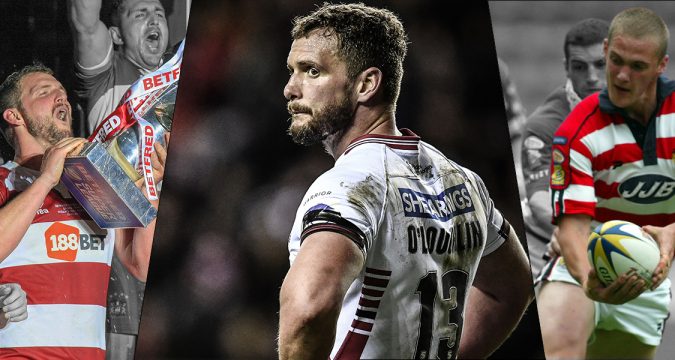
For almost 20 years, Sean O’Loughlin has crafted a reputation as one of the finest players of his generation. While terrace rivalries can sometimes cloud judgement, almost every player who has come across O’Loughlin’s path – as either a team-mate or an opponent – speaks highly of a man who has perhaps become one of Wigan’s greatest ever captains.
But now at the age of 37, and having clocked up his 500th career game last week against Castleford, just how does O’Loughlin stay at the very top of his game after so many matches, so many injuries and so many gruelling battles out on the field?
In the run-up to the new Super League season, it was fascinating to spend some time not speaking with O’Loughlin about rugby, but about everything away from the field to discover how someone approaching the age of 40 can still perform at the very highest level.
One thing quickly becomes clear: as O’Loughlin’s 30s have gone on, he has had to adapt. It is very much a case of evolution, rather than revolution: and that begins before he even walks through the doors at Wigan. “Off-seasons get more and more important,” he explains.
“You have to be smarter with training the older you get. Any niggles, you might have to skip more sessions but it’s planned out very well for me here. I know what I’m doing when I come in and part of the benefit of being here so long is that all the physios and staff know what works for me.
“The most important thing for me is being on the field to play rugby so I’ll dip in and out of the conditioning these days. I won’t do as much running now, I don’t need to do that anymore. It’s about gearing my week towards the field sessions now whereas the younger guys will split the field and gym stuff fairly evenly.”
“These days, every week that ticks by and you haven’t done something in the off-season, it’s like adding another three weeks onto pre-season! You don’t have to do much to maintain it, but you have to do something – more than I would have done in an off-season a few years ago.
“I can’t just go on a five-mile run either because I know I’ll pull up, so it’s getting that balance between doing something, and not doing too much. The balance is increasingly delicate the older you get, but I always try and keep myself ticking over in the off-season so I’m not playing catch-up in the off-season.”
Pre-season, in the minds of many, is all about running up hills, lifting weights and conditioning players to the maximum. While that is perhaps true for younger players, O’Loughlin is much different.
“My running days are over,” he laughs.
“You have to be smarter with training the older you get. Any niggles, you might have to skip more sessions as the most important thing for me at my age is being on the field to play rugby, so I’ll dip in and out of the conditioning these days.
“I won’t do as much running now, I don’t need to do that anymore. It’s about gearing my week towards the field sessions now whereas the younger guys will split the field and gym stuff fairly evenly.”
What happens away from training is just as key to O’Loughlin’s ongoing success despite his age.
“If you sit and do nothing after a game you know you’re going to get stiff and tighten up easily,” he says. “Some people can sit on the couch all day on a Saturday and relax after a game but I like to keep moving and keep active all the time. Maybe that’s part of what’s got me this far.. who knows.”
Another key part of O’Loughlin’s rigorous regime? Diet.
“We all joke in life that we can’t eat as freely as we used to without putting on weight – that’s definitely applicable to rugby players as they get older, too,” he says.
“I’ve always eaten well so I’m fortunate I’ve got that in the locker. I don’t know where I’d be know if I’d binged when I was younger without consequence and had to change. That’s something I pride myself on. Boozing is the big one; if I have a drink after a game I know I’ll feel it Monday mornings these days so you have to pick your weekends after the age of 30. I suspect that’s not just exclusive to me though!”
But above all the dietary and training adaptations, there is one thing O’Loughlin believes is more important than anything else in getting to such a momentous milestone. “If I could tell any young guy breaking into the first-team one thing, it would be to enjoy it,” he insists.
“If I wasn’t enjoying it anymore, you wouldn’t be as committed or competitive and then you’d fade away with a bit of a whimper. At 37, I’ve still got a smile on my face and that’s what I’d tell anyone. You’ve got to always have that drive; I’m proud I’ve still got the chance to play at this level and it keeps me going.”
